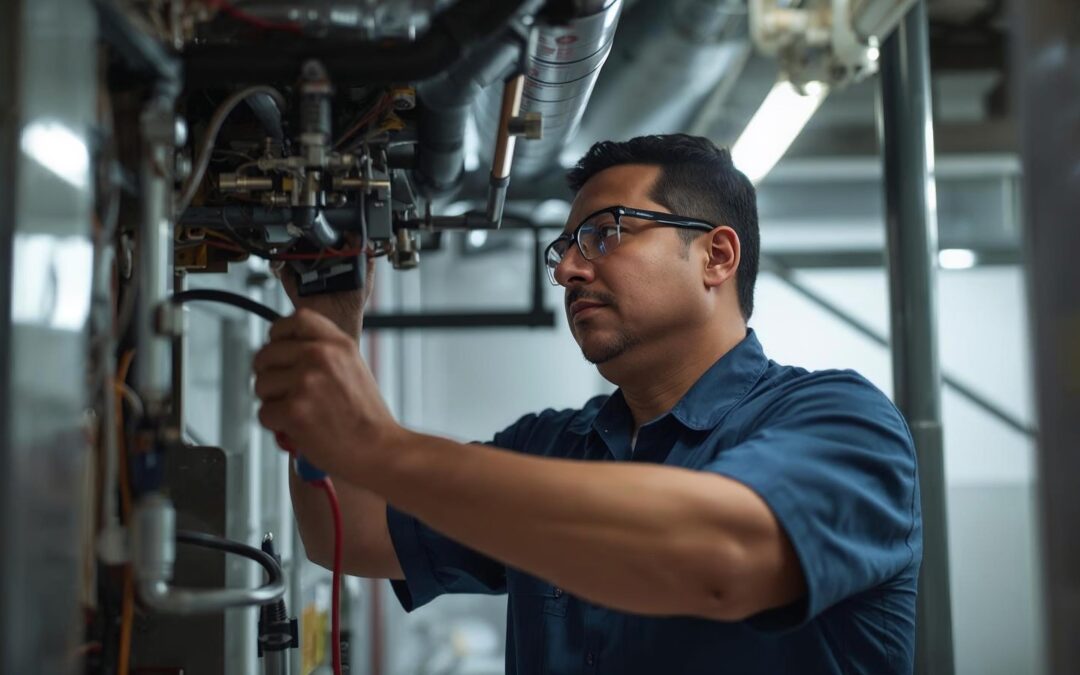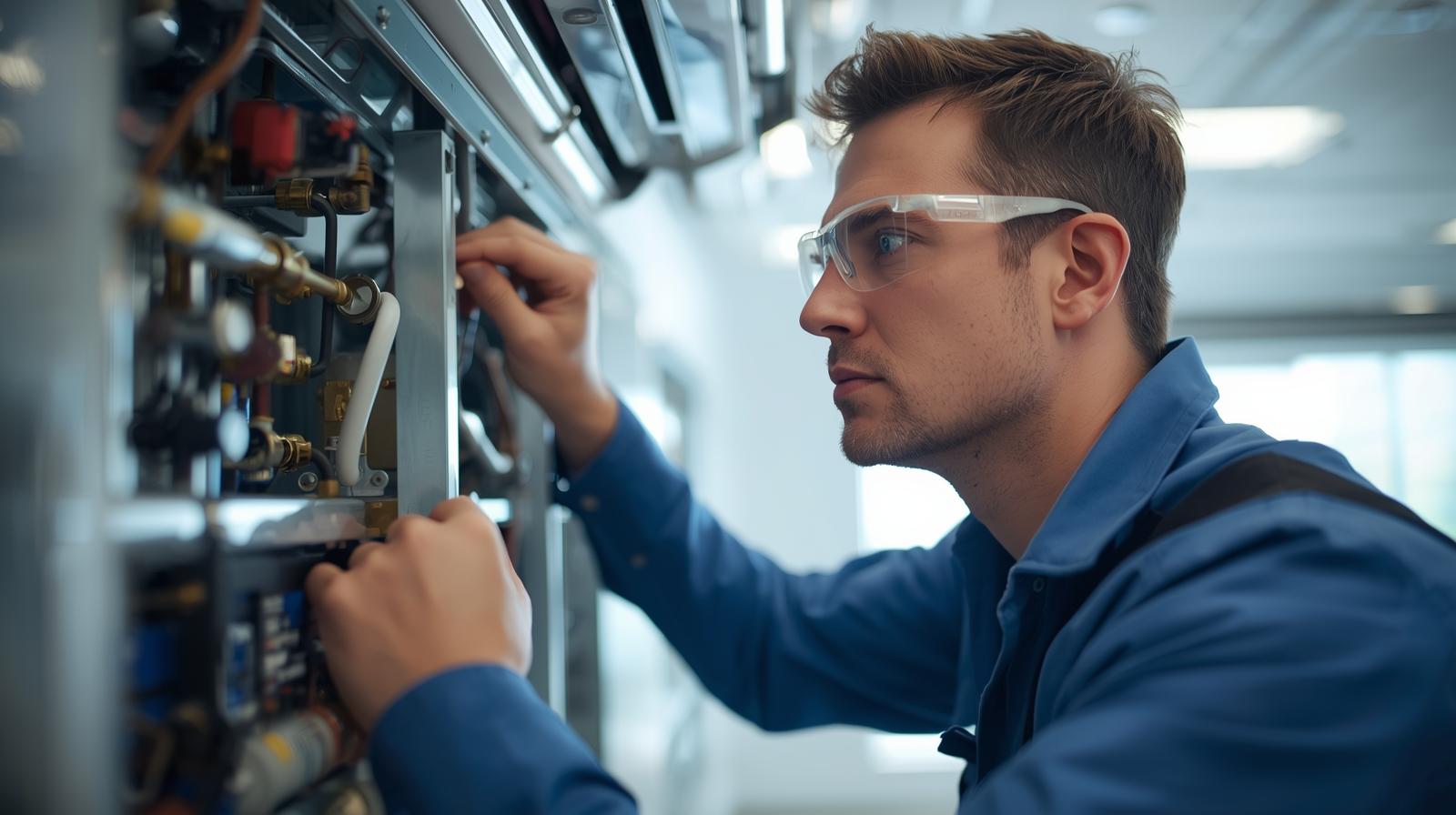In Columbus, a single HVAC or plumbing problem can bring an entire commercial campus to a standstill. Winter freezes, summer heat, aging systems, and strict regulations push mechanical infrastructure to the limit, making preventive commercial hvac maintenance the only defense against shutdowns, costly repairs, and unhappy occupants.
Annual Maintenance Plans Protect Systems Long-Term
A strong maintenance plan is more than a checklist. It’s a proactive strategy to catch small issues before they become costly failures. Testing systems under realistic seasonal loads ensures your building’s interconnected infrastructure can handle year-round demands.
Heating and cooling systems need regular calibration and inspection to stay efficient. Even when everything appears to work, hidden problems can raise energy costs and shorten equipment life. Key maintenance tasks include:
- Calibrating control systems to keep heating and cooling balanced across all zones.
- Inspecting heat exchangers to maintain efficiency and prevent energy losses.
- Checking refrigerant levels to protect compressors and ensure optimal cooling.
- Testing airflow and replacing filters to reduce strain and improve air quality.
- Inspecting motors, belts, and bearings to prevent wear-related failures.
- Servicing AC units to verify safety controls and overall performance.
- Maintaining split systems to extend efficiency and longevity.
Plumbing systems carry their own risks, particularly water damage and sewer backup. Annual inspections should look for aging pipes, sediment buildup in water heaters, and faulty pressure relief valves — issues that often lead to emergencies like burst pipes during freezes. In Columbus, some inspections are required by code, including backflow prevention valves and flood or drainage systems.
Routine service not only safeguards against breakdowns but also extends system life, keeps operations efficient, and ensures compliance with local regulations.
Bundled HVAC and Plumbing Maintenance Plans Reduce Disruptions
HVAC and plumbing systems may appear separate, but they often share infrastructure, exist in shared building environments, and often contribute to parallel operations issues. A condensate backup in a cooling system, for example, can result in a plumbing overflow. Similarly, ventilation problems can be linked to underlying drainage or pressure-regulation issues in a building’s water system.
When different vendors manage these systems independently, the potential for miscommunication or missed symptoms increases. In turn, diagnosing overlapping issues becomes more difficult, and small details can slip through the cracks. Rather than treating HVAC and plumbing as disconnected systems, bundling routine service and inspection with a single professional company supports a complete view of a property’s mechanical performance. Bundled commercial hvac service provides tailored maintenance, repair, and replacement solutions specifically for business and commercial properties, ensuring comfort and reliable operation. Technicians can more readily identify cross-system dependencies and address problems from a broader context that makes faster root-cause analyses and comprehensive resolution possible.
Bundled solutions also simplify logistics. Fewer services reduce disruptions for tenants and staff, while coordinated inspections ensure no part of the building is overlooked. Improved documentation provides building managers with a detailed record of issues and performance, invaluable when making insurance claims or proving due diligence during legal or financial scrutiny.
Service Contracts Help Optimize Energy Efficiency
Maximizing energy efficiency is one of the most important benefits of regular commercial HVAC maintenance. When systems are properly maintained, they operate more efficiently, consume less energy, and help keep energy bills in check.
Technicians can fine-tune thermostat settings, clean condenser and evaporator coils, and replace filters to ensure the system is running at its best. They also inspect and repair ductwork to eliminate leaks and prevent energy losses that can drive up energy costs. By focusing on these key areas, regular maintenance not only improves system performance but also reduces the building’s overall energy consumption and environmental impact. Investing in energy-efficient commercial HVAC maintenance is a smart way to lower operational costs, extend equipment life, and create a more sustainable business environment.
System-Wide Preventive Maintenance Saves Money
Annual maintenance carries a cost, but the risk of deferring it almost always comes with a higher price. Reactive repairs tend to be unplanned, consuming valuable time and resources, and often with the added expense that comes with after-hours service calls.
By contrast, proactive resolution through preventative maintenance lowers long-term operational expenses. Regular inspections and scheduled upkeep help identify issues early. A minor refrigerant imbalance that’s addressed during a scheduled inspection can prevent a major cooling-system failure in the middle of summer. Replacing a valve before the temperature drops and the first snow falls can protect a building against the catastrophic damage that follows a frozen pipe. Even in situations where major repairs are needed, planning them during normal business hours gives property managers more control over scope, timing, and budgets.
Routine service also helps extend the service life of HVAC and plumbing infrastructure, as well-maintained systems experience less wear and operate closer to their original specifications. Preventative maintenance leads to a longer lifespan for HVAC and plumbing equipment. This results in reduced energy consumption and a greater amount of time before capital equipment like furnaces and chillers need to be replaced. Neglected maintenance causes systems to use more energy, increasing operational costs.
The fixed nature of contracted bundled service makes it easier to anticipate future needs, define what’s covered under the plan, and create detailed timelines for recommended repairs. Over time, greater control and predictability translate into more accurate budgeting, enhanced asset management, and more strategic long-term investment.
Regulatory Compliance and Documentation is Always Readily Available
The regulatory environment surrounding HVAC and plumbing systems has tightened in recent years. In Columbus, components such as backflow preventers must be tested and recertified annually by licensed professionals. Failure to comply with these mandates can trigger fines, citations, and even service disruptions if serious violations are found.
Additionally, HVAC systems are subject to various codes and insurance requirements related to safety and energy performance. Proper documentation of inspections and maintenance helps demonstrate responsible business practices, which can be crucial during audits. Such records also help verify that systems have been checked for fire hazards, electrical safety, and other code-specific conditions.
Documentation is even more important for buildings pursuing energy efficiency or sustainability goals. Certifications like LEED require detailed proof of maintenance practices and environmental performance. Without reliable records, properties may lose or fail to qualify for programs that can yield financial incentives, such as grant accessibility and tax deductions. It is also essential to maintain records and ensure technicians receive ongoing training to properly install and service new equipment with advanced features.
What to Expect from a Bundled Service Contract
First and foremost, a well-structured service agreement outlines responsibilities and duties in clear language that defines seasonal maintenance needs and allows for anticipatory planning before peak demand periods. Bundled service contracts typically include commercial heating systems to ensure reliable operation year-round. The best contracts outline expectations for response times, especially when follow-up or after-hours service is needed, with provisions for property-specific needs.
Detailed reporting, including identified issues, actions taken, and recommendations for future work, should be included with every inspection. Some include digital service logs that make it easier to track work across multiple systems and view service history in a single portal.
The most important part of a service contract is consistency. Routine inspections and maintenance performed by the same technicians can build familiarity, reduce diagnostic time, and help prevent recurring issues from going unidentified.
Protect Your Campus with a Proven Maintenance Partner
For commercial campuses in Columbus, scheduled routine maintenance is a strategic imperative. A well-designed bundled service plan provides a practical means to avoid the consequences that follow deferred or neglected upkeep, maintain compliance, and protect the investment in a property as an asset. Regular maintenance also leads to improved air quality for building occupants by ensuring proper airflow and preventing issues like mold and moisture damage.
Enervise in Columbus, Ohio has helped commercial properties in and around the area plan for the future and stay ahead of unplanned disasters for nearly three decades. If bundling HVAC and plumbing systems is something you’re considering, contact us today to speak with a service specialist who can provide the answers and support you need.




